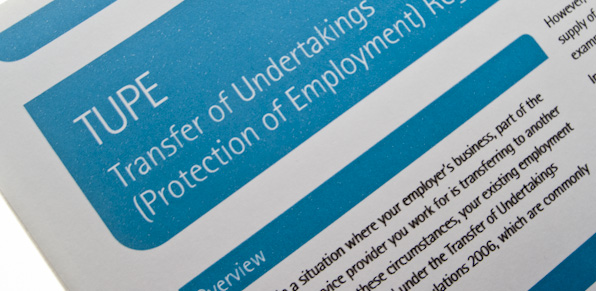Generally, TUPE regulations apply to “undertakings” as defined in European Law. This clearly covers the transfer of a business.
Does TUPE apply to the transfer of the business?
This is one of the most common questions I am asked in relation to TUPE regulations. Unfortunately, there is no easy answer and each case must be decided on its particular circumstances and facts.
Questions that need to be looked at include:
- Are the majority of employees transferring to the transferee?
- Are tangible assets being transferred?
- Are customers being transferred?
- Are the activities being engaged in before the transfer similar to those engaged in after the transfer?
- What is the value of the intangible assets of the business which is being transferred?
The 2nd most common question I am asked in relation to TUPE concerns the awarding of a new contract or the change of service provider of an existing outsourced function in a business.
Transfer of business versus transfer of contract
The transfer of a contract, for example to provide a service such as security or catering, raises additional questions which must be looked at.
The EAT and the European Court of Justice has held, from time to time, that the transfer of a contract can give rise to the TUPE regulations applying. However, there is a number of different types of change of service provider:
- A first generation transfer arises when a business decides to contract out a function of its business, for example cleaning or catering or security
- A second generation transfer arises where a business decides to change its existing service provider
- Bringing back in-house an activity which was previously outsourced to a service provider.
When looking at these transfers of a contract critical factors include:
- Was there a transfer of significant intangible or tangible assets?
- Was there a transfer of the majority of workforce associated with the contract?
So, there is a qualitative difference between a transfer which involves the transfer of employees alone and one which involves the transfer of an undertaking which is asset intensive.
In an asset intensive undertaking TUPE may not apply if it is only employees who transfer, and not assets, either tangible or intangible.
In a labour intensive undertaking, for example security or cleaning, if the transferee refuses to accept the majority of employees then TUPE will probably not apply.
Problems for transferee
If you are successful in winning a contract and TUPE applies then you need to consider the following:
- Taking on new staff, and the associated costs
- Ensuring that the new staff taken on maintain their existing terms and conditions, and having to deal with any friction which may arise with your existing workforce in circumstances where the new arrivals may have better terms and conditions
- Taking on new costs associated with the transfer of employees, for example the cost of carrying out redundancies, if necessary.
It is for this reason that the negotiation of a sound indemnity, to cover these types of liabilities, from the grantor of the contract is strongly advisable, and why you should legal advice to ensure you are well covered in this regard.
However, the awarding party will seek to ensure that any liability is fully transferred to you as the successful new service provider and may also insist that a term is inserted in the contract, regardless of the particular circumstances of the transfer, that TUPE regulations apply.
If this is the case you will need to factor this into the value of the contract and the amount you are prepared to tender to win it.
What to do if you are tendering for a TUPE contract
If you are tendering for a contract where TUPE regulations apply you need to be diligent in carrying out your research.
You need to
- Make thorough enquiries to ascertain whether the existing contractor will want to transfer employees to you; if that is the case, you need to look closely at the terms and conditions of the employees.
Section 21 of the Employees (Provision of Information and Consultation) Act, 2006 provides you with protection in this connection as section 21 obliges the transferor (outgoing contractor) to notify you of all rights and obligations of the employees to be transferred. However, to obtain the protection of this act you, as transferee, must ask for this information from the transferor.
- Check for any hidden liabilities, for example claims from employees against the transferor. These claims will transfer to you with the TUPE transfer.
- As advised above, negotiate the best indemnity (ies) you can to protect you against liabilities post transfer.
- You should really be satisfied with the replies to all your enquiries discussed above before signing a contract or agreeing a price.
This article should be read in conjunction with this one: TUPE,The Transfer of Undertakings Directive and Regulations-The Essentials for Irish Employers and Employees.
